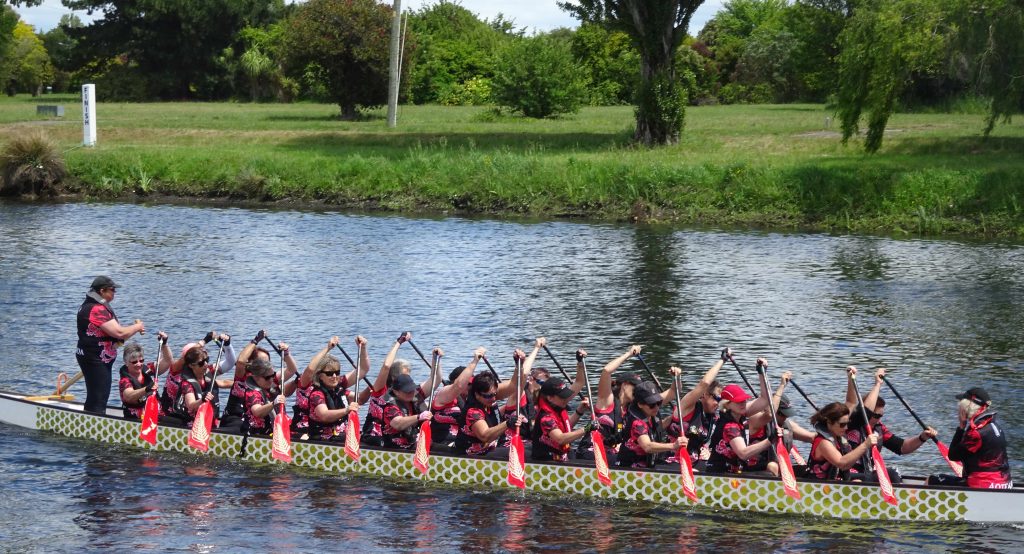Exercise is Medicine
When Meri Gibson received a call in 2024, she laughed and thought it was a prank. Instead, the four-time cancer survivor and impassioned dragon boater discovered she would be honoured as an Officer of the New Zealand Order of Merit (ONZM), her mantra that ‘exercise is medicine’ acknowledged at the highest level. Words Pip Goldsbury.

Vivacious and colourful, Meri Gibson is a picture of health, her personality overflowing with enthusiasm and positivity. Yet, she’s also steely and smart, her conversation peppered with traces of a strong businesswoman who leads success. However, scratch a little deeper and Meri’s story is one that defies the odds, one that’s inspirational, heart-warming, and generous.
In 1989, career-driven Meri was feeling ‘a little burnt out’. Living the high life as a company director and travelling the world, Meri was diagnosed with cervical cancer. Not one to fuss, the cancer was cut out and Meri got on with life. Shortly afterwards, she was engaged to her second husband, married and pregnant, the birth of her ‘wonder child’ at odds with the medical professional who’d said she wouldn’t bear children.
Fast-forward five years to 1995 and Meri was once again diagnosed with cancer, this time ovarian. Again, Meri ‘just got on with it’ and she was back on track … until Christmas 1999 when she received a breast cancer diagnosis. This one gave Meri reason to pause. Highly malignant, she credits her GP, Leigh Hooper, for saving her life, although in typical Meri fashion, she laughs that she insisted on reconstruction surgery in conjunction with her mastectomy. Surely by now, enough cancer, but no! Meri received another breast cancer diagnosis in 2011.
Happily, the cancer is gone but it did come at a cost, as Meri explains. ‘A big statistic for breast cancer survivors is that marriages end, often very quickly. Mine was a year.
You can have people all around you, but it’s an incredibly lonely adventure because you’re the one going through it. All the stuff in your head, all the stuff in your body, you’re the one living it. It’s hard for that other person. In a way, I think you shut them out.’
Turning cancer on its head, Meri speaks of ‘disease’ as ‘the body at dis-ease’ and says, ‘If your body is at dis-ease and if you don’t sit up and take notice, you get smacked around the head until you do. It’s not that you’re meant to die or pop off your mortal coil, but you’re meant to sit up and take notice.’
Particularly, Meri wants young women to take notice. At just 43 when she received her first breast cancer diagnosis, she was relatively young. However, Meri’s also referring to the women in their twenties, the ones she says, ‘aren’t meant to get breast cancer’ because it’s traditionally viewed as an ‘old lady disease’.
In 2006, at the funeral of a breast cancer friend, a group of women wearing pink boas caught Meri’s eye. Her interest was piqued when she discovered they were breast cancer dragon boaters and one thing led to another. Meri attended the dragon boating open day and by the time the crew won gold at the national championships in 2007, Meri was hooked.
Initially, Meri’s contribution to dragon boating was her competitive sporting ability. However, in mid-2007, with change afoot, Meri was reluctantly roped into the boardroom, her business expertise too irresistible for her Christchurch-based club. The result? The Aoraki Dragon Boat Association was born, a not-for-profit organisation, with Meri at the helm. It didn’t take long before the national body followed suit and she was in, paddles and all, on the boats, in the boardrooms, coaching, seeking funding, sourcing equipment, and leading the way.
‘If your body is at dis-ease and if you don’t sit up and take notice, you get smacked around the head until you do.’
A mover and shaker, Meri was getting noticed on the international scene, and in late 2013, she was shoulder-tapped by the International Breast Cancer Paddlers Commission, immediately appointed as vice president at the four-yearly Congress in 2014 and later, in 2018, president. Back then, 19 countries and 190 teams were competing. Under Meri’s leadership, this expanded to nearly 40 countries and 400 teams! In addition, Meri sits on the International Dragon Boat Federation Council as an associate vice president.
The only way into one of the breast cancer boats is by diagnosis, but out of the boat comes empowerment, laughter, friendship and understanding. Meri’s mantra that ‘exercise is medicine’ is a positive affirmation that fitness is good for both body and mind. Meri speaks of an oncology doctor in Croatia where she ran an outreach clinic. ‘She was so emotional and said, “From Monday, I will be recommending to every patient of mine and to all my colleagues that dragon boating is part of the recovery.”’
It feeds Meri’s soul, sharing dragon boating with others who’ve experienced the hell of breast cancer. And that’s why she has widened her net. Meri has formed a Rainbow crew, aptly named Rainbow Warriors. Facing a complex range of issues including homophobia, transphobia, discrimination and bullying, dragon boating offers a safe and connecting space for the LGBQTIA+ community.
Meri’s also in the process of forming a Para crew. She’s got the funding, the kit, the lifts, and even the name – Purple Rain – but now she needs the team. ‘My goal is to leave nobody on the dock,’ she smiles. Because, when Meri says, ‘It’s a sport for life, it’s a sport for all,’ you know it’s not just about longevity, it’s about living.

